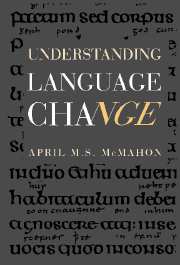Book contents
- Frontmatter
- Contents
- Preface and acknowledgements
- 1 Introduction
- 2 Three views of sound change
- 3 Sound change 2: the implementation problem
- 4 Morphological change
- 5 Syntactic change 1: the Transparency Principle
- 6 Word order change and grammaticalisation: language change and general laws
- 7 Semantic and lexical change
- 8 Language contact
- 9 Linguistic variation
- 10 Pidgins and Creoles
- 11 Language death
- 12 Linguistic evolution?
- Bibliography
- Index
12 - Linguistic evolution?
Published online by Cambridge University Press: 05 June 2012
- Frontmatter
- Contents
- Preface and acknowledgements
- 1 Introduction
- 2 Three views of sound change
- 3 Sound change 2: the implementation problem
- 4 Morphological change
- 5 Syntactic change 1: the Transparency Principle
- 6 Word order change and grammaticalisation: language change and general laws
- 7 Semantic and lexical change
- 8 Language contact
- 9 Linguistic variation
- 10 Pidgins and Creoles
- 11 Language death
- 12 Linguistic evolution?
- Bibliography
- Index
Summary
Introduction
One of the most controversial issues in current historical linguistics (if not all linguistics) is the question of whether metaphors borrowed from biology should be applied to language. Some intimidatingly famous names have objected strongly to the introduction of metaphors and analogies into linguistics: Saussure, for instance, declares himself ‘firmly convinced that anybody who sets foot in the realm of language may consider himself abandoned by all the analogies of heaven and earth’ (quoted Percival 1987: 3). In fact, biological models and concepts were very frequently invoked by linguists and philologists during the nineteenth century, and have only in this century been seen as inappropriate and even distasteful. Evolution, in particular, has become a ‘dirty word’ in modern linguistic theory.
There are good reasons for the fact that ‘serious use of biological metaphors is common among professional linguists through the early nineteenth century, but after that is confined mostly to amateurs’ (Wells 1987:42). For metaphors to be successful, the borrowers of concepts from other fields must know what they are borrowing, not merely in outline but in detail. Otherwise, ‘such borrowings often turn from theoretical claims into sloppy metaphors, leading to varieties of “vulgar X-ism”, the result of overenthusiastic appropriation with insufficient sense of the subtlety or precise applicability of the originals’ (Lass 1990: 79). As we shall see, this is precisely what happened in the case of nineteenth-century extensions of evolutionary concepts to linguistics.
- Type
- Chapter
- Information
- Understanding Language Change , pp. 314 - 340Publisher: Cambridge University PressPrint publication year: 1994
- 1
- Cited by



